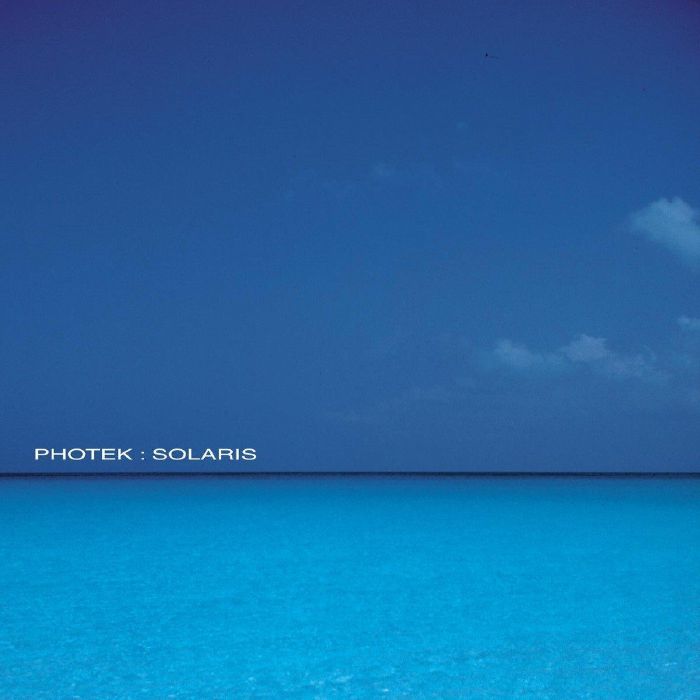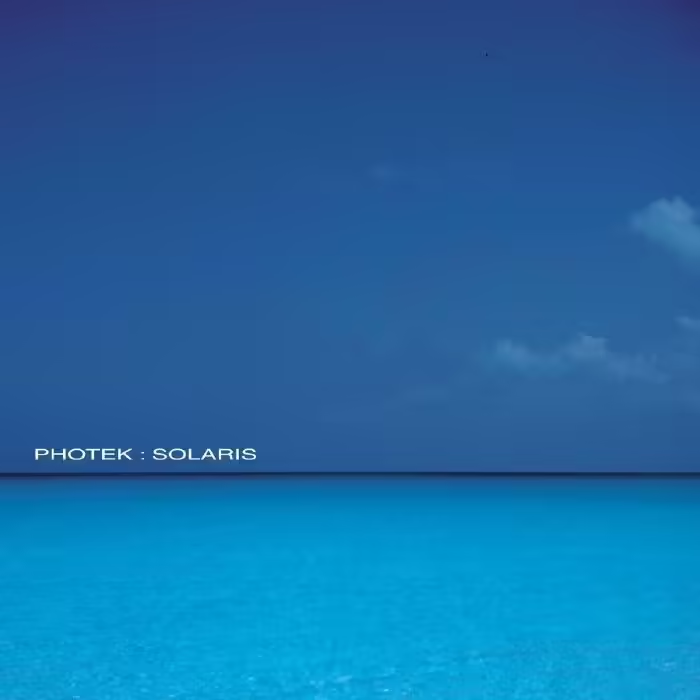Dusted Down : Photek – Solaris (Proper) | Juno Daily
Photek’s controversial follow up to Modus Operandi is set for reissue

Solaris is polarising. There’s no two ways around that fact, even 24 years after its original September 2000 release. The divisive second album by 90s d&b legend and Metalheadz alumni Photek, who these days recently resurfaced in Miami for a coveted but exceedingly rare DJ appearance. It’s important to know the context of the scene at the time before we can realistically analyse Solaris with a proper lens – especially with such mixed critique as it got at the time, receiving a wince-inducing 2 from Pitchfork.
In the 90s, when jungle and d&b ruled the roost, Rupert Parkes fell in love with electronic production and started making waves as Aquarius under the long-lost Good Looking Records, helmed by LTJ Bukem. A quick scroll through the miraculously intact Dogs on Acid forums will give you an idea of what happened to Bukem and his initial crew, but at the time they were the names to know. MC Conrad, Tayla, Pariah, Blame et al. GLR is cemented in dnb history, and Bukem’s confusingly titled Looking Good Records would go on to become a whole other beast as he delved deeper into the liquid that crowds demanded, much to the dismay of the ’92 -’98 Puritans.
It was a Virgin Records, high on the success of Daft Punk’s Homework album, that gave Parkes his big break, setting up the Science sub-label forhim and good friends Source Direct. After a few years of success under many different names – Studio Pressure, Sentinel, The Truper and many more – it was ultimately under Photek that Parkes would release one of the greatest d&b records of all time. Modus Operandi was hugely influential, due to its uncompromising complexity and originality. It spawned a wave of enthusiastic fans behind Parkes work, further bolstered by his 1998 follow-up compilation Form & Function, which collected the EP serties that spawned classics like ‘The Water Margin’, ‘Rings Around Saturn’ and ‘The Seven Samurai’. The era was critically raved about, with his debut scoring on Fact’s top 100 albums of the 1990s and still being in the g.o.a.t. conversation to this day on subreddits and forums.
Imagine, then, the shock and dismay caused when Photek not only completely pivoted to atmospheric techno and deep house, but also seemed to spit on the genre on the way out:
“I’ve almost wanted to disown jungle. It’s sounded to me like nothing more than funky reggae beats to horror film noise…adolescent aggression…There was nothing there for me to respond to.”
He said this on the phone to an uncredited Our Town columnist back in 2000, who would jarringly badmouth the sophomore album in the next paragraph after the pleasantries. Parkes was fed up with the increasing bpm and decreasing creativity of jungle and drum & bass, the very same plague hounding Detroit techno in the days of +8 and Plastikman.
Enter ‘Solaris’, the perfectly symmetrical, infamous blue horizon snapped by the legendary Cookie Kinkead – inspired by the bright blue planet from the aforementioned Tarkovsky work. From the gate, it evokes the very dated, but cool nonetheless, space age era where every music video had to have robots and spaceships in it. Opening track ‘Terminus’ must’ve been quite the musical jumpscare for the Operandi lovers with its hazy synths, techno keys and boom-bap drums, conjuring up a metallic beach without a cloud in the sky. ‘Junk’ keeps the waves rolling in with warbled sines and deep house ideology. Sit back and relax.
The sticking points for listeners were the numerous Chicago house tracks, two of which feature legendary Fingers, Inc. vocalist Robert Owens: the back-to-back ‘Mine to Give’ and ‘Can’t Come Down’ – which Pitchfork reviewer Brent Sirota quaintly called the “flimsiest, most predictable house numbers ever created”. Harsh words towards the two bouncy numbers fit with cheesy snares and even cheesier lyrics. That’s a rather harsh assessment – they’re a bit of fun and it’s a genuine 90s house sound that the world is sorely missing right now if you ask us.
Whilst he’s always been dabbling in other genres, Parkes himself has even slowly slipped back through the door into the d&b scene – one could argue – through his soundtracks over the past decade, most notably, last year’s Call of Duty Modern Warfare 2. Even his awesome 2016 Need for Speed soundtrack, as well as a handful of lockdown-era snippets, has a little kick to it that prompts nigh-on annual articles anticipating his return to the promised land. This tale is far from over, and the atmospheric Solaris is necessary reading in the story of Rupert Parkes much to the chagrin of some close-minded junglists.
Looking back on it, the nostalgia factor even adds to the appeal of Solaris. This reviewer for one didn’t like it on the first few listens and was bracing himself to add to the pile of negative critique. But if you remove any previous bias then the album remains a light and danceable piece of electronic history from one of Britain’s greatest minds. A few house cuts shouldn’t mark the end of the world when the epic basslines of ‘Infinity’ dominated the runtime. That speaks to the jungle echo chamber that had been constructed, as well as a reluctance to give other genres the time of day.
Yes, it’s very much a product of its time, but is that such a criticism when the late 90s and early naughties can claim some of the most necessary dance cuts the world will ever see? I wouldn’t be alone in proclaiming it one of Astralwerks primo offerings. It all boils down to whether you bend to the gatekeeping pretentiousness of forums and journalists or get up and dance like Photek wanted to the whole time. One nation under a groove anybody?
Pre-order your double vinyl copy of Solaris, out May 31, by clicking here
Casey Faulkner


